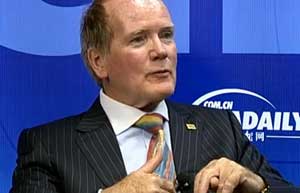German business confidence falls less than forecast
Updated: 2011-09-27 07:45
By Christian Vits (China Daily)
|
|||||||||
|
A Daimler AG Mercedes-Benz truck on display at the Frankfurt Motor Show. The company expects truck sales to keep growing, despite the economic slowdown gripping the eurozone. Hannelore Foerster / Bloomberg |
FRANKFURT - German business confidence fell less than economists forecast in September, suggesting Europe's largest economy may avoid recession even as the region's debt crisis and consumer confidence worsen.
The Ifo Institute in Munich said its business climate index, based on a survey of 7,000 executives, dropped for a third straight month to 107.5 from 108.7 in August. That's the lowest since June 2010. Economists forecast a decline to 106.5, according to the median forecast of 41 economists in a Bloomberg News survey.
Germany's benchmark DAX share index has plunged 29 percent over the past two months as the global outlook worsened and Europe's debt crisis eroded confidence in the region's banks.
Governments from Spain to Ireland have toughened austerity measures, damping demand for German exports. While the Bundesbank said last week that the economic outlook "has clouded more than previously expected", it still anticipates "robust" growth in the current quarter.
"Germany will see an economic slowdown but we don't expect a recession so far," said David Milleker, chief economist at Union Investment GmbH in Frankfurt. "However, if credit supply were hampered in Germany, the economic outlook would change rapidly."
'Remarkable difference'
Ifo's gauge of the current situation decreased to 117.9 from 118.1, while an index measuring executives' expectations slid to 98, the lowest since July 2009, from 100. Both fell less than economists had predicted.
"It's a remarkable difference between the assessment of the current situation and expectations," Ifo President Hans-Werner Sinn said in an interview with Bloomberg Television. "The current business situation is still rather robust."
The European Commission on Sept 15 cut its eurozone growth forecast for the second half and warned the economy may come "close to standstill at year-end". The International Monetary Fund (IMF) on Sept 20 lowered its growth forecast for both Germany and the euro region this year and next.
Germany's economy will expand 2.7 percent this year and 1.3 percent in 2012, the IMF predicted.
Investor confidence
German investor confidence fell to the lowest in more than two and a half years in September.
Exports unexpectedly declined for a second month in July, underscoring signs the economy is losing momentum as the global recovery falters.
Eurozone services and manufacturing output shrank for the first time in more than two years in September and consumer confidence tumbled to the lowest in two years on increasing recession fears.
Deutsche Lufthansa AG on Sept 20 cut its full-year profit forecast and said it would deepen capacity cuts this winter after the latest results were weaker than expected as the growth slowdown hampered forward bookings.
Some companies aren't feeling the slowdown yet. Lanxess AG, Germany's largest publicly traded specialty-chemicals maker, said last week that business improved in the third quarter from a year earlier on higher demand for synthetic rubber.
Daimler AG, the world's largest maker of heavy-duty vehicles, expects truck sales to keep growing, and Adam Opel GmbH raised its sales forecast for its Zafira model after receiving a positive response at the Frankfurt Motor Show for the car.
The euro's decline against the dollar in recent months could boost export returns. The Bundesbank is still predicting economic growth of 3 percent this year as falling unemployment bolsters household spending.
"There's no reason to panic even though the German economy is likely to cool considerably," said Lothar Hessler, an economist at HSBC Trinkaus & Burkhardt AG in Dusseldorf, Germany.
"Domestic demand could cushion the downturn somewhat and Germany is better positioned than others in terms of competitiveness and debt problems."
Bloomberg News
(China Daily 09/27/2011 page17)











